Headlines
 Leaders from across CU Boulder and NIST gathered last week to celebrate the official launch of the Quantum Engineering Initiative Lab space within the College of Engineering and Applied Science. The newly dedicated area will connect quantum researchers across campus with NIST researchers and local industry.
Leaders from across CU Boulder and NIST gathered last week to celebrate the official launch of the Quantum Engineering Initiative Lab space within the College of Engineering and Applied Science. The newly dedicated area will connect quantum researchers across campus with NIST researchers and local industry.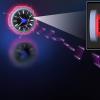 JILA and NIST Fellows Ana Maria Rey and James K. Thompson and their collaborators have discovered how to generate a new flavor of entanglement: two-mode squeezing—a type of entanglement that can potentially be used to improve the best atomic clocks and sense how gravity changes the flow of time.
JILA and NIST Fellows Ana Maria Rey and James K. Thompson and their collaborators have discovered how to generate a new flavor of entanglement: two-mode squeezing—a type of entanglement that can potentially be used to improve the best atomic clocks and sense how gravity changes the flow of time. The DOD's competitive Multidisciplinary University Research Initiative (MURI) Program has awarded three projects at CU Boulder, a number matched only by MIT. Konrad Lehnert (Physics, JILA) will lead one of the projects, which explores using quantum phononics to advance quantum information processing.
The DOD's competitive Multidisciplinary University Research Initiative (MURI) Program has awarded three projects at CU Boulder, a number matched only by MIT. Konrad Lehnert (Physics, JILA) will lead one of the projects, which explores using quantum phononics to advance quantum information processing. Earlier this month, the National Academy of Sciences (NAS) announced that it has elected Ana Maria Rey (JILA, NIST) to join its ranks in 2023. A theoretical physicist and quantum research leader, Rey has helped to develop, among other things, the most accurate atomic clock ever created.
Earlier this month, the National Academy of Sciences (NAS) announced that it has elected Ana Maria Rey (JILA, NIST) to join its ranks in 2023. A theoretical physicist and quantum research leader, Rey has helped to develop, among other things, the most accurate atomic clock ever created.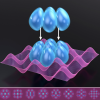 Dipolar gases gases consist of atoms or molecules that possess a non-zero electric dipole moment, which gives rise to long-range dipole-dipole interactions between particles. These interactions can lead to a variety of interesting and exotic quantum phenomena.
Dipolar gases gases consist of atoms or molecules that possess a non-zero electric dipole moment, which gives rise to long-range dipole-dipole interactions between particles. These interactions can lead to a variety of interesting and exotic quantum phenomena.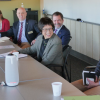 Heidi Shyu, under secretary of defense for research and engineering at the U.S. Department of Defense, got a first-hand look at the future of CU Boulder’s trailblazing research in quantum, aerospace, hypersonics and more when she visited campus on Monday, April 17.
Heidi Shyu, under secretary of defense for research and engineering at the U.S. Department of Defense, got a first-hand look at the future of CU Boulder’s trailblazing research in quantum, aerospace, hypersonics and more when she visited campus on Monday, April 17.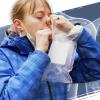 JILA researchers have upgraded a breathalyzer based on Nobel Prize-winning frequency-comb technology and combined it with machine learning to detect COVID with excellent accuracy. Their work represents the first real-world test of the technology’s capability to diagnose disease in exhaled human breath.
JILA researchers have upgraded a breathalyzer based on Nobel Prize-winning frequency-comb technology and combined it with machine learning to detect COVID with excellent accuracy. Their work represents the first real-world test of the technology’s capability to diagnose disease in exhaled human breath. This spring, the Department of Physics and the College of Engineering and Applied Sciences (CEAS) at CU Boulder launched the Quantum Scholars program, which serves 53 undergrads who meet monthly to learn about quantum sciences and engineering.
This spring, the Department of Physics and the College of Engineering and Applied Sciences (CEAS) at CU Boulder launched the Quantum Scholars program, which serves 53 undergrads who meet monthly to learn about quantum sciences and engineering.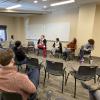 To celebrate the important research and discoveries in science that have been made by women, and to support the next generation of female scientists, the United Nations dedicated February 11 as "International Women and Girls in Science" day. To honor this tradition, JILA hosted a panel discussion and open forum.
To celebrate the important research and discoveries in science that have been made by women, and to support the next generation of female scientists, the United Nations dedicated February 11 as "International Women and Girls in Science" day. To honor this tradition, JILA hosted a panel discussion and open forum. The award places Sun among the next generation of scientific leaders in the U.S. and Canada. At JILA, Sun's research focuses on quantum optics, nanophotonics and experimental quantum information science. His group studies strong light-matter interactions at the quantum limit.
The award places Sun among the next generation of scientific leaders in the U.S. and Canada. At JILA, Sun's research focuses on quantum optics, nanophotonics and experimental quantum information science. His group studies strong light-matter interactions at the quantum limit.

